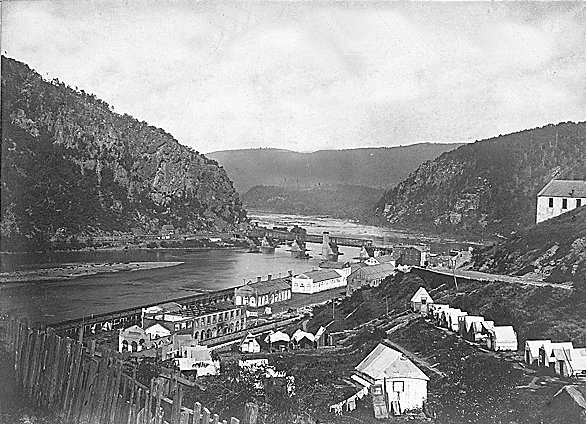October 3rd, 1862
Harpers Ferry, Oct 3rd, 1862
Dear Wife,
I move from one place to another so often1 that I despair of hearing from you, but I shall continue to send you a line as often as I have opportunity. If we march into Virginia tomorrow I may not have another opportunity soon. I wrote you two short letters at Frederick, which is the best place I have seen since we passed Philadelphia but we could not stay there but two days of course. We were ordered to pack our duds and yesterday morning we did so and had to wait ’till dark before we got aboard the cattle cars. We should have preferred to have marched it if we could have had our baggage carried for us but we had no choice but Hopkin’s choice. When we got in Ace put his head out of the side of the cars (there were no windows), brayed like a jackass; he’d said if he had got to be a mule he would make mule music.
We got into Harpers Ferry at one o’clock at night and then had to tote our load up a hill about three miles and then lay down beside the road and slept till morning, when we found we had got up the wrong hill, so we had to march down and up another where we are now posted. How long we stay here I can’t tell, but I think not long. There are a great many troops about here and at Frederick but what we are here for I can’t tell unless it be to cross into Virginia. If we do cross we may see a fight but if we don’t there is no danger of the Rebs coming here again at present.
I wish we had a general that knew enough to use all of the men we have got but we have not. I should like to go in and fight and then what are left go home, but I must watch and wait and possess my soul in patience.
I should like much to hear from you and baby and to hear what is going on about home. You must write often and direct to the 20th Reg. C.V. via of Washington. Joel wants you to tell his folks to direct the same way. He wrote them to direct to Frederick. If they do he will never get it but if you direct the other way we shall get it sometime. I am in hopes to hear from you tonight, I suppose I should have had two letters if I had stayed at Arlington.
We left several sick at Arlington but no one that you know. My health is better now than it has been since I left home. I have no cough or sore throat now but I did have at Washington. All the boys that you know are well.

I might tell you something about this place but it is hardly worthwhile, there is nothing but high hills all about us with a deep cut for the river to run through and very poor houses here and there with marks of the recent battle2 on the outside and filled with wounded men inside. Taken all together it is the meanest place I have seen yet, worse than Washington.
Dear wife, I have to write you and should like to hear from you better but you must keep up good courage if you don’t hear from me very often for there is no man in the company that has as much to see to as I have. The Capt. thinks that we have it a little rougher than he did in North Carolina3 but I guess we can stand it.
From your affectionate husband,
C. A. Burleigh
-
In the month between Cecil being mustered into the service and the date that he wrote this letter, his unit had moved from Connecticut, to Capitol Hill, Washington D.C.; from Capitol Hill to Camp Chase in Arlington Heights; from Camp Chase to Frederick; then from Frederick to Harpers Ferry. ↩
-
The Battle of Harpers Ferry was fought September 12-15, 1862, two weeks before Cecil arrived in Harpers Ferry and wrote this letter. It was a demoralizing loss for the federal army; a striking victory for the confederates. As General Robert E. Lee’s men invaded Maryland, he split his army and sent “Stonewall” Jackson to destroy the Federal detachment at Harpers Ferry. Colonel Dixon Miles, in command of the Federal force had set himself up for failure - instead of having his forces occupy the commanding positions out of town on the steep hills, he insisted on keeping his soldiers in the town. When Jackson arrived, he placed artillery batteries on those hills and proceeded to bombard the Federal forces. Miles quickly saw that fighting was futile and proceeded to surrender to the Confederates. All told, the Federal army had 44 men killed, 173 wounded, and over 12,000 captured. The Confederates had 39 killed and 247 wounded.
After quickly processing his prisoners, “Stonewall” and his men rushed to Sharpsburg. By the time Cecil arrived, the Confederates had fought the battle of Antietam and retreated back into Virginia. ↩
-
Prior to his service in the 20th Connecticut, Ezra Dickerman was a Corporal in the 10th Connecticut Infantry, which saw heavy service in the costal campaign of early 1862 in North Carolina. Ezra himself was wounded in the chin during his first engagement at Roanoke Island, but quickly returned to the ranks and continued his service until in the summer of 1862 he was called away to be promoted to Captain of Company I, 20th Connecticut Volunteer Infantry. ↩